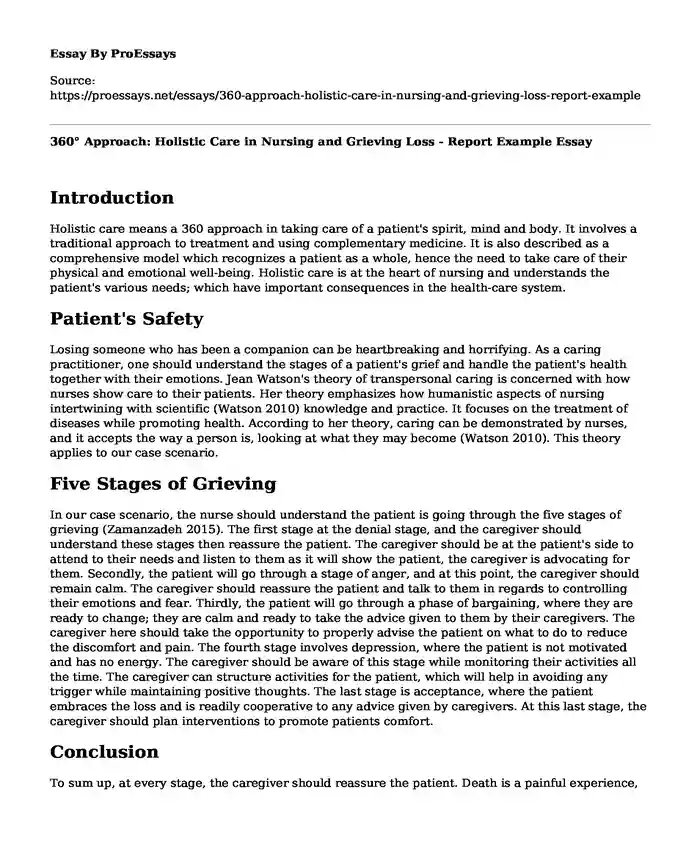Introduction
Holistic care means a 360 approach in taking care of a patient's spirit, mind and body. It involves a traditional approach to treatment and using complementary medicine. It is also described as a comprehensive model which recognizes a patient as a whole, hence the need to take care of their physical and emotional well-being. Holistic care is at the heart of nursing and understands the patient's various needs; which have important consequences in the health-care system.
Patient's Safety
Losing someone who has been a companion can be heartbreaking and horrifying. As a caring practitioner, one should understand the stages of a patient's grief and handle the patient's health together with their emotions. Jean Watson's theory of transpersonal caring is concerned with how nurses show care to their patients. Her theory emphasizes how humanistic aspects of nursing intertwining with scientific (Watson 2010) knowledge and practice. It focuses on the treatment of diseases while promoting health. According to her theory, caring can be demonstrated by nurses, and it accepts the way a person is, looking at what they may become (Watson 2010). This theory applies to our case scenario.
Five Stages of Grieving
In our case scenario, the nurse should understand the patient is going through the five stages of grieving (Zamanzadeh 2015). The first stage at the denial stage, and the caregiver should understand these stages then reassure the patient. The caregiver should be at the patient's side to attend to their needs and listen to them as it will show the patient, the caregiver is advocating for them. Secondly, the patient will go through a stage of anger, and at this point, the caregiver should remain calm. The caregiver should reassure the patient and talk to them in regards to controlling their emotions and fear. Thirdly, the patient will go through a phase of bargaining, where they are ready to change; they are calm and ready to take the advice given to them by their caregivers. The caregiver here should take the opportunity to properly advise the patient on what to do to reduce the discomfort and pain. The fourth stage involves depression, where the patient is not motivated and has no energy. The caregiver should be aware of this stage while monitoring their activities all the time. The caregiver can structure activities for the patient, which will help in avoiding any trigger while maintaining positive thoughts. The last stage is acceptance, where the patient embraces the loss and is readily cooperative to any advice given by caregivers. At this last stage, the caregiver should plan interventions to promote patients comfort.
Conclusion
To sum up, at every stage, the caregiver should reassure the patient. Death is a painful experience, and having a newborn can be equally emotionally exhausting. Caregivers are crucial in determining how a person handles their situation and how their future will turn. Besides, caregivers should reassure the patients in every step.
References
Watson, J., & Woodward, T. K. (2010). Jean Watson’s theory of human caring. Nursing theories and nursing practice, 3, 351-369.
Zamanzadeh, V., Jasemi, M., Valizadeh, L., Keogh, B., & Taleghani, F. (2015). Effective factors in providing holistic care: a qualitative study. Indian journal of palliative care, 21(2), 214.
Cite this page
360 Approach: Holistic Care in Nursing and Grieving Loss - Report Example. (2023, Nov 06). Retrieved from https://proessays.net/essays/360-approach-holistic-care-in-nursing-and-grieving-loss-report-example
If you are the original author of this essay and no longer wish to have it published on the ProEssays website, please click below to request its removal:
- Topic: Effectiveness of Palliative Care on Management of Cancer
- Essay Sample on Coronary Artery Disease
- Essay Sample on Prevention and Control of Lung Cancer
- Essay Sample on Management of the Centre for Diseases Control Organization (CDC)
- Essay Example on Health Care Systems: Ensuring Health Security for the Population
- Essay Example on 83-Year-Old Woman's Journey Through Late Adulthood: An Interview
- COVID-19 in NYC: How My Life Changed in the Pandemic - Essay Sample







